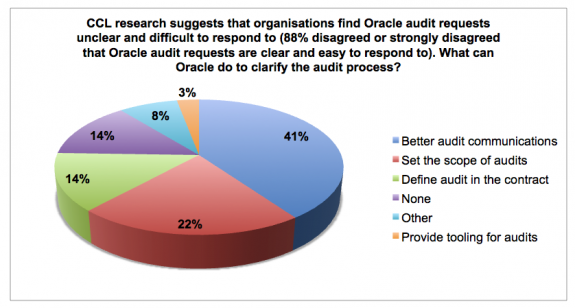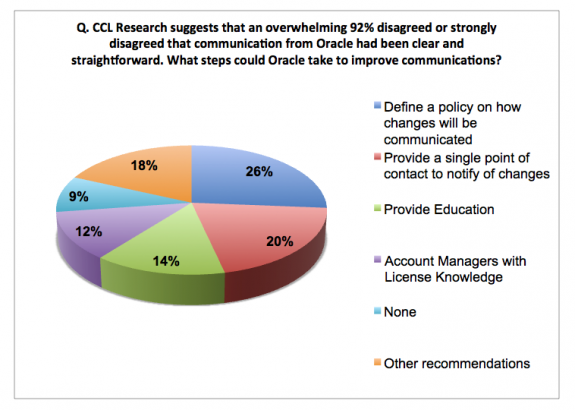Oracle – Positive recommendations for change
At our Oracle Seminar in London on the 21st November we included a session for delegates to provide their feedback on recent CCL research. Readers in the USA can attend a similar event on the 29th January.
The original research, ‘Key risks in managing Oracle Licensing’ can be found here: http://www.clearlicensing.org/key-risks-in-managing-oracle-licensing/
We asked delegates, all of which were end user organisations – what should Oracle do to improve? We were specifically looking for positive and constructive ideas to relay back to Oracle.
Firstly, we asked about Oracle audit processes:

Ideas from delegates as follows (in descending order of priority):
1. Provide Better Communications around audit practices
- When is an audit an audit? Oracle should provide clarity over ‘reviews’ ‘audits’ and sales fishing exercises.
- All round better communications with customers. Manage their expectations and be clear and concise on intentions.
- Communicate the steps and process of audits.
- Clearly define the measurement criteria.
- Communicate how data will be collected and shared with third parties or other teams at Oracle.
- Clearly state the objectives of the audit.
- Advise customers of SAM best practices and how to manage their Oracle estate
- Make the audit steps, methodology and scripts public.
2. Set the scope for audits
- Set out the process when notifying of an audit (Timetable, resources required, tools and data required, products included, territories/regions included, measurement criteria, expectations, scope)
- Make it clear what the scripts do, what is collected, where information is sent and who sees it.
- Scope should be fixed throughout the audit.
3. Define the audit process in the contract
- Detail audit process, scope and measurement criteria in the contract
- Negotiate specific terms with Oracle so you don’t have to rely on their language
4. Tooling to support audit process
- Provide tools to monitor regular use of products as part of software agreement.
- Providing better tools to allow us to better track/limit usage of licensed or unlicensed features.
With communication (or lack thereof) being such a key issue. We asked delegates – What steps could Oracle take to improve communications?
Ideas from delegates as follows (in descending order of priority):
1. Policy
- Define a policy for how customers will be updated on license changes
- Provide a clear history of the versions of contracts on the public website
- Provide advice and clarity on how to switch to new license models
- Develop an easy to use licensing website, make it easy to find and read documents
- Email customers about changes in terms and conditions specific to the customer, not just general updates. Do this at renewal time specifically but also on significant changes.
- Make it contractual to inform customers of changes. Put an obligation to inform their customers via one communication line in the standard contract, otherwise the change is not valid, i.e. for procurement
- Need to advise customers when upgrades include separately licensable elements, rather than expect customers to find out through other sources.
- Open and honest communication. Clearly defined contracts. Update their license model to reflect what businesses actually need. Publicise changes.
2. SPOC
- Assign single point of contact (SPOC) that will be responsible for the client.
- Also – use the right SPOC’s at the “customer side” e.g. contacting audit only through procurement, add this in the contract.
- Sending only the necessary and important information to the specific customers, proactive communication.
- Written communication to reduce misunderstanding and provide audit record. Minimise misinterpretation. Organise yearly seminars that is specific to communicating licensing requirements/changes/etc.
3. Education
- Customer briefings and workshops (licensing 101). Push notification of changes to customer contracts.
- Customer education, accessible material online. User forums. To do this they must build back trust in customer base. Assign license expert as part account team.
- Have clearer, almost idiot guides to licensing metrics.
- Issue clear definitions on license types and their usage. Provide alerts to key contacts on any changes that may make us suddenly non-compliant.
- Licensing certification program for end users organisations.
- Webinar on licensing for new products, similar to those carried out by Microsoft.
4. Sales
- Sales department should be in charge of explaining licensing changes to clients, and be put objectives on that.
- Account managers should notify and then meet clients to go through the changes and implications and have upfront honest conversation.
- Better account engagement – Oracle tend to divide and conquer our organisation to maximise opportunity.
- Have an agreed account plan (with customer) and stick to it, review it regularly. Control their sales force – ensure all stick to the plan.
- LMS consultants not being interested in revenues.
- Move away from revenue driven organisation to customer satisfaction (change KPIs to drive this and stop operating in silos for the different product pillars)
- Oracle account managers need to be available. They should support the customer, direct them or provide copies of documents/contracts/OD’s if required.
Oracle Recommendations
CCL has suggested seven areas for improvement. Delegates at our Oracle Seminar were asked to rate them in order or priority. The results were as follows:
- Strategic Focus – Customer satisfaction, relationship strength and strategic value should replace audit revenue as a key performance indicator.
- Audit Clarity – Oracle needs to be crystal clear with audit activity and adopt the Campaign for Clear Licensing code of conduct
- One voice please – organisations want clarity over Oracle license management from one voice. They don’t want to be passed around between departments who don’t communicate with each other.
- Knowledgebase – Oracle needs to invest in a well-organized knowledge base to educate its customers
- Re-engineer risk – As more organisations mature in their governance processes, more will shy away from Oracle as an unnecessary burden to manage. Oracle needs to engineer its products and license programs to reduce unnecessary risk. The focus of control needs to be placed in the hands of the business not developers.
- Software Asset Management Evangelism– Oracle needs to help educate its customers to assign appropriate resource for managing software and proactively assist with licensing training and management practices around Oracle software.
- Communicate – Oracle is not being invited to participate in key business conversations because of mistrust. Oracle needs to step up conversations and provide clarity to regain trust.
Oracle, are you listening? We’ve talked to Oracle customers, we’ve talked to Oracle LMS, we’ve highlighted the major risks and also provided positive and constructive ideas for change.
The Campaign for Clear Licensing has written an open letter to Oracle. Now is the time for action.
- Tags: Oracle · oracle corporation · oraclefeature
About Martin Thompson
Martin is also the founder of ITAM Forum, a not-for-profit trade body for the ITAM industry created to raise the profile of the profession and bring an organisational certification to market. On a voluntary basis Martin is a contributor to ISO WG21 which develops the ITAM International Standard ISO/IEC 19770.
He is also the author of the book "Practical ITAM - The essential guide for IT Asset Managers", a book that describes how to get started and make a difference in the field of IT Asset Management. In addition, Martin developed the PITAM training course and certification.
Prior to founding the ITAM Review in 2008 Martin worked for Centennial Software (Ivanti), Silicon Graphics, CA Technologies and Computer 2000 (Tech Data).
When not working, Martin likes to Ski, Hike, Motorbike and spend time with his young family.
Connect with Martin on LinkedIn.

